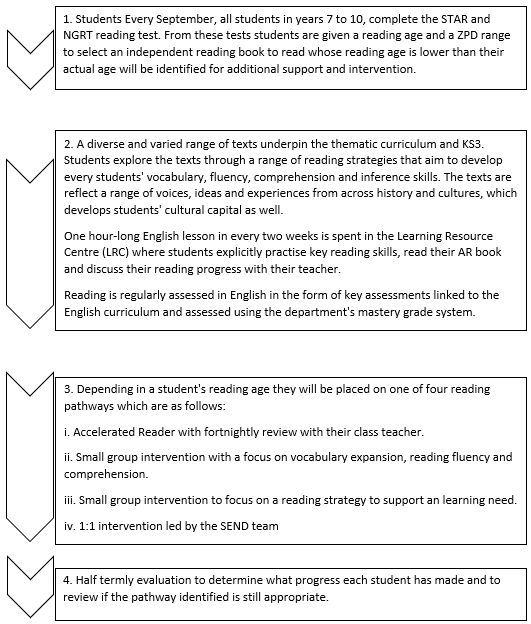Our Whole School Approach to Reading at Ridgeway
Literacy and reading is a top priority at Ridgeway, with key programmes and strategies built into both the curriculum and key aspects of the school day, to ensure that every student develops the necessary skills to access every element of their learning.
Click here to see the KS3 Literacy journey our KS3 students experience!
Reading just twenty minutes per day builds empathy for others, creates a strong vocabulary, and positively affects and boosts your mental and physical health!
Developing a lifelong love of Language and Literature is at the core of everything we try to achieve at Ridgeway Secondary School. We understand that secure literacy skills are the keys to success, not just in English lessons, but across the whole school curriculum and beyond.
Years 7 to 10 have four dedicated form reading sessions a week. Each form is a given a text to read and they spend three half hour sessions exploring the text for pleasure, whilst developing their fluency, vocabulary and comprehension skills through a range of reading strategies.
By tutors reading to and with the students, we can supplement the texts with valuable contexts that boosts student knowledge and understanding, drawing links to the wider curriculum as appropriate.
The books have been carefully selected by staff to promote and inspire a love of reading, whilst improving students’ wider cultural knowledge of the world around them.
Our newly developed Learning Resource Centre is home to thousands of books, covering every genre, from classics to contemporary fiction. Open every lunchtime and after school to 4pm, students have access to this space to complete homework and further develop their independent reading by engaging in the Accelerated Reading programme.
Accelerated Reader is a nationally recognised programme which tests pupils’ reading age and ability, before recommending books within a ‘Zone of Development’. Pupils who read books within this ‘zone’ have been proven to experience rapidly improved progress in reading. All pupils in Years 7, 8, 9 and 10 are enrolled on the programme.
All KS3 students have a dedicated literacy lesson once a fortnight in the LRC, where a range of reading skills will be explicitly taught and practised, and students will be given the opportunity to quiz and change their reading books. Students are expected to quiz every 3 weeks or twice a half term, with staff regularly reviewing students’ progress.
Staff continually have literacy training, which is underpinned by the latest evidence-based theories and ideas in developing literacy skills. By enabling staff to become confident in teaching methods, a consistent approach to evolving all students’ literacy skills is embedded across the curriculum.
For our students who require a little additional help to bring their reading ages up to the necessary level, we have developed the reading pathway below to ensure that every student gets the support they need.

It is of paramount importance that students have a reading age that is commensurate with their chronological reading age. Without this, it is very difficult for them to achieve success at GCSE level. 68% of all student mistakes made in GCSE examinations are because of students misunderstanding the questions asked.
Our aim is to enthuse students through this reading opportunity, and we ask that as parents and carers, you show interest at home and consider the following strategies to support:
Make time – Set aside a regular time to read together. Little and often works best! Just 30 minutes a day can make a huge difference!
The local library – Join the local library and your child can pick a free book based on their interests.
Not just books – Some children are relunctant readers of fiction. Encourage them to read different material and in different formats!
- Talk drives literacy – encourage your children to talk at home and try to stretch their vocabulary. Ask them about their day at school and their learning as a starting point for dialogue.
- Let your children see you reading – it is particularly important that boys see adult males reading as it is easy for them to assume that reading is the preserve of women and is not ‘cool’. Take an interest in what your children are reading – if they are enjoying a particular author, book or genre, then read it too and you can share the experience with them.
- Encourage your children to read aloud – reading aloud helps cement literacy skills more than anything else.
- Don’t assume, because your children read fluently, that they actually comprehend all they read. Ask them questions to check their understanding of more challenging vocabulary.
- Whilst it is obviously better for children to read anything rather than nothing, it is particularly important that children read works of fiction. Fiction really extends vocabulary and comprehension – particularly for boys.
- Continue to visit the local library and encourage your children to go with you.
- If electronic devices are the only way your children want to read then do encourage them to use Kindle or similar e-readers.
- It is easy for children to become reliant on IT for writing. Sadly, this does not prepare all students for impending examinations where spelling, punctuation and grammar are of considerable importance. Encourage them to write, at least from time to time, by hand. Thank you letters provide a regular opportunity for most children to put pen to paper.
- Encourage your child to participate in events like ‘the Big Read’ or encourage them to take part in a book club.
- Make sure that your child reads during the summer holiday period. Students often regress in terms of their reading ability during this time which puts them at a disadvantage in accessing the curriculum when they return to school in September.

